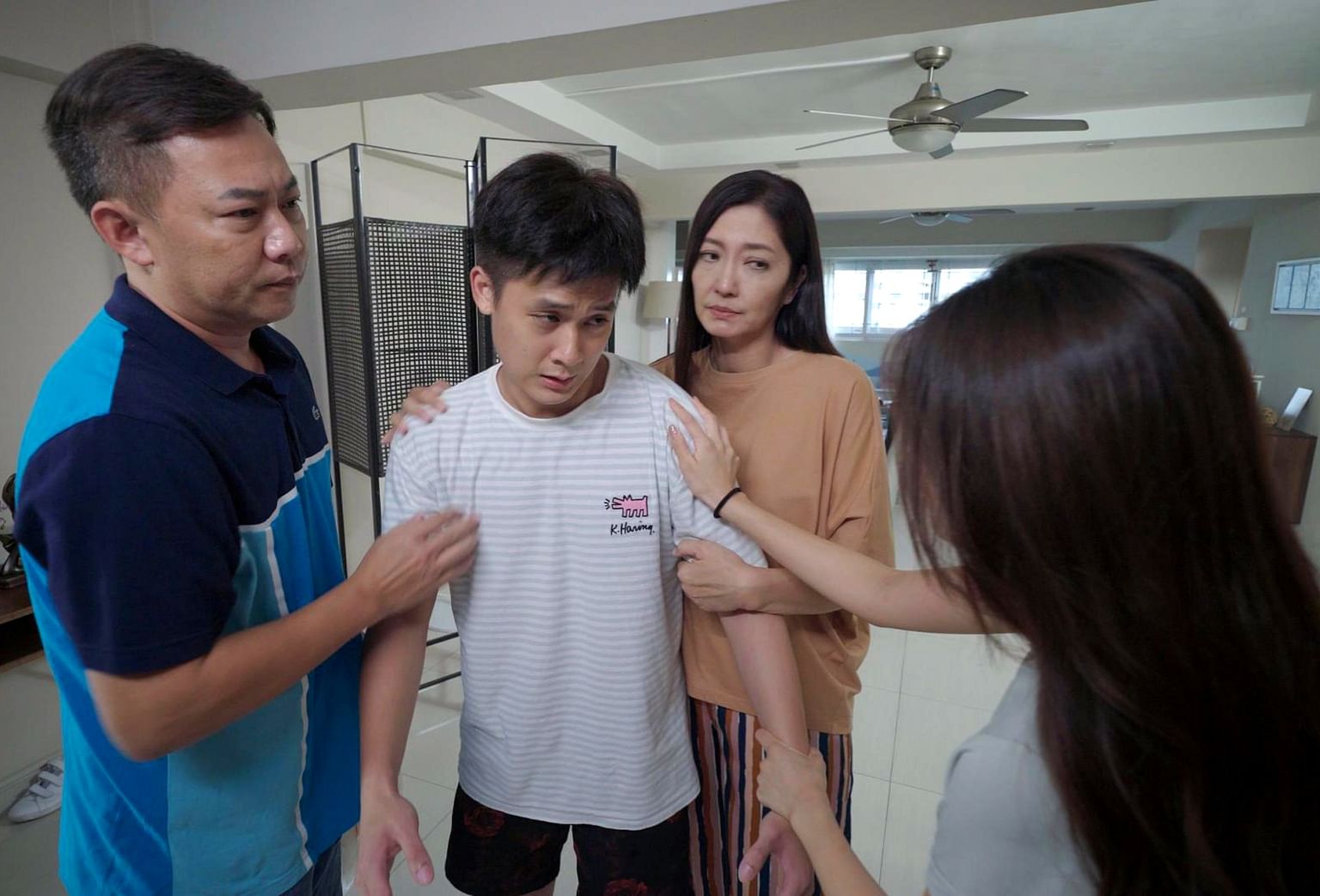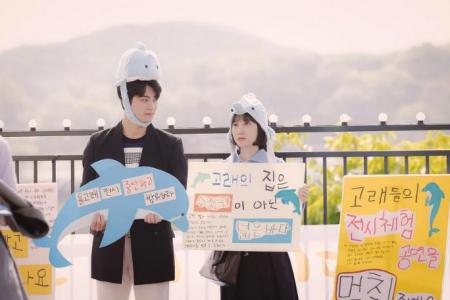Autism advocates hope for more diverse representation beyond Extraordinary Attorney Woo
Extraordinary Attorney Woo may be the breakout K-drama hit of the year, smashing viewership records and topping Netflix's most-watched charts.
But it took Ms Andreana Tay some time to get used to the 16-episode courtroom series about a rookie lawyer with autism spectrum disorder (ASD). Its final episode aired on Aug 18.
The 27-year-old social media manager, whose 18-year-old sister Audrey is autistic, says watching media depictions of autism is often "a leap of faith".
She says: "Every time I hear about such shows, I'm scared to even watch them. I don't want to know about it if it's a bad portrayal, but I also want to know how the media views people like my sister."
ASD refers to a broad range of lifelong, neurodevelopmental conditions characterised by challenges with social skills and speech; repetitive behaviours and non-verbal communication.
Individuals on the spectrum can range from being able to live independently to requiring significant support in their daily lives.
Woo Young-woo, the protagonist of Extraordinary Attorney Woo played by Park Eun-bin, possesses an IQ of 164 and can hold down a professionally demanding legal job.
She is considered to be an autistic savant - a rare condition in which people with developmental disorders show extreme talent in certain areas such as memory, music or art.
Ms Jill Lim, a 49-year-old book editor whose 18-year-old daughter is autistic, enjoyed the few episodes she watched.
She says: "In the first episode, the bewilderment of Young-woo's father at his five-year-old child not speaking and his joy when she finally spoke - I found that quite affecting as a parent.
"I also like that she is central to the series. When there are loud noises, there are distortions in the visuals which let us see what she is experiencing."
But the series is not reflective of Ms Lim's experience raising a child with autism, which she has written about in the media.
She says: "Young-woo is a genius with incredible gifts. That doesn't apply to my child nor to a lot of people with autism."
In popular media, characters with autism are often depicted as geniuses or otherwise high-functioning, such as in the film Rain Man (1988), Netflix comedy Atypical (2017 to 2021) and K-dramas Good Doctor (2013) and Move To Heaven (2021).
Ms Fann Koh, a 52-year-old housewife with two daughters aged 18 and 15 who have autism, says: "I have encountered many who believe that people with autism must have a special talent. They would then think that those skills can be put to good use and will make life easier for the person involved.
"They do not see that in many cases, those traits may be how the persons communicate or express themselves, for example, through drawing. Or a security blanket that is predictable in the chaotic world they live in, such as an interest in calculus."
Mr Bernard Chew, chief executive of St Andrew's Autism Centre, a non-profit caring for those with moderate to severe autism, hopes for more diverse depictions of autism that reflect the range of needs of people who are autistic. His son Evan, 18, has moderate to severe autism with intellectual disability.
Depending on where one lies on the spectrum, autism can be associated with cognitive impairment.
The 49-year-old says: "If you belong to the category of people with autism without significant cognitive impairments, then what you want people to understand could be what you can do, to give you a chance to be employed, to have a level of support that allows you to function fully in society. A lot of that advocacy would hinge on focusing on your ability rather than what you cannot do.
"But an overfocus on ability is, ironically, counter-productive to advocating for someone on the more severe end of the spectrum, because where does that put the people who are not able to do many things in life because of cognitive impairments? Rather than ability, we should therefore advocate on the basis of the dignity of the individual person.
"In a way, some of the things we may very instinctively ascribe value to, such as the ability to hold a job and be self-reliant, disempowers people on the moderate to severe end of the spectrum."
Some, too, find the series' portrayal of autism skewed towards the palatable.
In the series, Woo exhibits quirks such as sticking to gimbap (seaweed rice rolls) for almost all her meals. A strict adherence to routine is often a trait among those with autism.
Ms Lim, whose teenage daughter can be prone to outbursts when things deviate from how they were planned, says Woo's "oddities" are mostly portrayed as "cute".
She says: "You'll smile along watching it, but it's nothing as disruptive or distracting as it can be in real life. Autism quirks are stressful. Many people with autism, my daughter included, do have quite upsetting meltdowns where they can even hurt themselves."
Member of Parliament Denise Phua, 62, recognises the drama's limitations, but commends an episode in which Woo defends a client with a more severe iteration of autism.
Ms Phua is also president of the Autism Resource Centre and co-founder of Pathlight School, and her 26-year-old son is autistic. She says: "It is hard to portray the range (of autism and intellectual disabilities) in one story, but it is possible to be conscious of reflecting the differences in the script.
"For instance, efforts were made to feature another person with autism who is quite different in ability and behaviour from Young-woo."
Winning more acclaim from the neurodivergent community is the popular Channel 8 series Your World In Mine, the final episode of which aired on Aug 12.

At the heart of the 20-parter is an adult named Zheng Tiancai (Richie Koh) who is intellectually disabled and has the mental age of a seven-year-old. The heart-warming show depicts the struggles his family goes through to take care of him.
Mrs Anita Ow and her 17-year-old daughter Anna, who has Down syndrome, were consulted in the making of the drama and met lead actors Koh, Huang Biren and Hong Ling. Huang and Hong play Koh's mother and sister respectively in the show.
Anna, a student at ITE College East, praises his performance.
"I enjoyed the show. I think his acting is good, he does act similar to some of my friends at the Down Syndrome Association."
Mrs Ow, 60, who works in logistics at an e-commerce platform, is thankful the cast and producers chose to learn more about their lives before filming Your World In Mine, such as how people with intellectual disabilities have "their unique challenges, strengths, dreams and aspirations".
She was also moved after watching the final product.
"What the mother went through when she made the decision to raise the child and her journey over the years was very touching and felt very real to me," she says.
Your World In Mine resonated with Ms Tay, too, as Tiancai's siblings also bear the responsibility of caring for him.
Her sister, who has autism, is non-verbal and communicates via gestures and expressions.
Ms Tay says: "There have definitely been times when I felt like, 'Why do I always have to give in and take care of her? I'm also my parents' child, so why am I the one who has to shoulder this burden?' That part was quite accurate."
Ms Sally Teo, a teacher assistant at Movement for the Intellectually Disabled of Singapore (Minds), is also a fan and is glad the story spotlighted caregivers.
The 53-year-old says: "The hardships faced can be very physically demanding and psychologically stressful. In the long term, it can be damaging and (the caregivers) also suffer from burnout."
Ms Teo, who has nine years of experience working with students with special needs, also feels Koh did justice to his character and "nailed" the traits.
"It was very touching and impactful, without being exaggerated. I feel he did his homework - he must have studied and interacted with people with intellectual disability or autism."
Despite some mixed feelings, the caregivers, advocates and educators who spoke to The Straits Times welcome the on-screen airtime and representation of neurodivergence, as it raises more awareness for such conditions.
But what they hope for is more inclusion and understanding in real life.
Ms Koh says: "The important thing is what people choose to do after watching such a show.
"Do they want to learn more? Do they want to reach out to people on the spectrum? Will they become kinder, more patient? Will they now pause before they judge someone who is doing something out of the norm?
"Exposure is better than no exposure, but it would be more effective to provide better education and accurate information to the general public instead of hoping dramas can do the work."
Extraordinary Attorney Woo is available on Netflix and Your World In Mine is available on meWatch.
Get The New Paper on your phone with the free TNP app. Download from the Apple App Store or Google Play Store now


